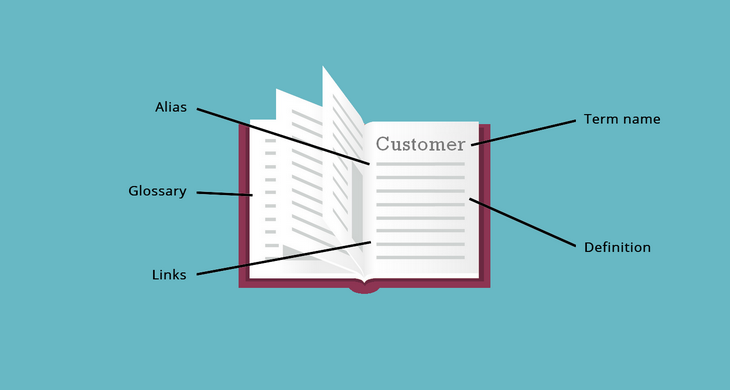These are fundamental questions in modern data governance and data management: “Why do I need a business glossary? Who cares?” The counter argument usually runs: “Isn’t a business glossary more documentation that no one ever uses anyway?” I assert that, if the value of both data dictionaries and business glossaries were more widely understood, then the question of “Who cares?” would not be asked because the simple, obvious and true answer is: “You do”.
You may hear the term “business glossary” quite a bit nowadays. Ironically, many people use the term incorrectly. Confusing a business glossary and a data dictionary is extremely common. So, let’s start by briefly defining our terms.
A data dictionary gives you information about a specific field in a database – What is the name of the field? Is it alpha numeric? Is it 6 characters in length? It belongs to x table(s). It is a private key or a foreign key? And, if you are lucky, a definition of the kind of information which should be in that field.
Many people think that a business glossary is an enterprise data model. After all, isn’t an enterprise data model a single data model which is used by the entire company? Yes, that is true, but an enterprise data model is a formal representation and has strict governing rules. It is usually drawn and defined in the same way that a logical data model is defined for any relational database. A business glossary is not at the database level; it is at the business level.
Now that we know what a business glossary isn’t, let’s discuss what it is. A business glossary holds definitions of business concepts and is related to semantics, ontology and meaning. A business glossary is comprised of terms (business concepts), synonyms, antonyms, and related terms that broaden or narrow the base term’s meaning. A business glossary is fluid. It is business language which is controlled and updated by the business although facilitating the updates and management of the business glossary often falls to the data governance organization within IT or operations. Most importantly the terms in the glossary reflect how you use language in the context of your specific business. For instance, I worked at one company where employees were always referred to as colleagues. So, you say, employee = colleague …. Yes, but the meaning of colleague is richer and was chosen by the company after much thought – it was a cultural statement for the company to maintain a collegial, collaborative and cordial culture. Another company I worked for had two main divisions, one referred to their customers as “customer” and the other division referred to them as “client”. While the terms are closely related, the characteristics of a customer were very different than client even though both purchased product from the company. Knowing if it was a client or a customer was extremely important in marketing and sales efforts. The function of the business glossary is to illuminates a term’s meaning, its semantics, based on the business context of that specific organization.
To be at its most effective, a business glossary must be readily and easily accessible within your company, it must be populated with meaningful terms and there should be a process to keep the terms up to date as your business changes. When this is the case, the business glossary is a tool which enables clearer communication within your organization, between IT and the business, and even with regulators.
Within your organization, the business glossary is a vehicle for training new personnel and a good reference for consistency in your reporting and in performance metrics. As a company how do you want to standardize the calculation of your days sales outstanding? What is a fiscal month? What is a fiscal year? A good business glossary will not only answer those questions, it will also provide you information as to where you may be able to find those values within your systems or databases. Business glossaries will often have the information as to who is the “owner” of the term, meaning the person who has the right to define it or authorize changes to the definition, which makes finding who to ask for additional information easier.
As the business glossary should allow you to declare in which databases and columns you can find the values related to that term, it is a wonderful way to communication with IT if you need assistance with queries, reports or systems / databases. The common language held in the business glossary democratizes data knowledge – the developer can understand the full business meaning and the business users can clearly articulate what data they are interested in when they request assistance with ad hoc data pulls.
Another basic functionality which should be in all business glossaries is a way to identify which business concepts are critical in your regulatory reporting. While sometimes referred to as “critical data elements” the business concepts, like the legal final maturity of a bond, may be in many systems. Other critical data elements, like AUM or NAV, are really calculations which may be comprised of many individual data points in many columns across many systems. If the critical data element is identified at the concept level with ownership and identification of where this information resides within your environment, the business glossary becomes a powerful tool to get answers to regulators questions quickly.
Simply, the ability to have understanding of your specific business at your fingertips is why you should care and given the advances in affordable systems which supply business glossary functionality, businesses of any size can set up and profit from a business glossary. Looking forward, business glossaries are also the first step in defining relationships between the terms which becomes important for natural language processing and artificial intelligence.
So, who cares? You do.











 Sandra Recca
Sandra Recca


![Business Glossaries - The What, the Why, and the How [Webinar + Presentation + Article]](https://dataedo.com/asset/img/banners/blog/business_glossary_george.png)
